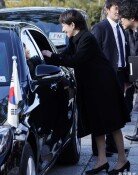[Editorial] Is Selective Disclosure of Bugged Tape Content Right?
[Editorial] Is Selective Disclosure of Bugged Tape Content Right?
Posted August. 09, 2005 03:07,
President Roh Moo-hyun commented yesterday on the 274 wiretapping recording tapes, saying, Let what should be revealed be revealed, and let the rest be kept secret. His argument was that the contents of the tapes include both criminal records that should be made public and investigated, and privacy that should be protected. What he argued is selective disclosure of the wiretapping record.
His remark underpins the position of the ruling Uri Party, which has argued for the enactment of a special law to reveal the contents of the tape. The situation looks familiar. Last year, president Roh drew a clear-cut conclusion for the dispute over the abolition of the National Security Law among Uri Party members by saying, The National Security Law should be sheathed and sent to a museum.
However, passage of a special law on the tapes has some unconstitutional elements. Experts point out that it goes against the principle of the separation of powers that a commission composed of civilians conducts the investigation on the tapes. It is also questionable if the politically neutral appointment of commission members can be guaranteed. In a nutshell, the controversy over the commission and its decision on the tapes has a dangerous possibility of triggering more major political strife, which will in turn translate into a wasteful national chaos.
President Roh rebuffed the opposition partys idea of introducing a special counsel for the investigation of the wiretapping scandal, saying, It is against common sense, and urged a wait for the result of the prosecutions investigation. However, this April, the prosecution dismissed illegal wiretapping charges against the National Intelligence Service (NIS) during the 2002 presidential election denounced by the Grand National Party after a two-year long investigation. That the NIS was uncooperative with the investigation was its excuse. Given this history, President Rohs argument is not very convincing.
President Roh has pushed for NIS reform for the past two and a half years, appointed reformists as main NIS staff members, and has instructed that the truth of the NIS history should be revealed. However, the NIS had repeatedly said until recently that there had been no illegal wiretapping since the inauguration of the Kim Dae-jung administration. It seems that the wiretapping was not a part of the truth about the NIS history that should be revealed.
President Roh is the successor of Kim Dae-jung regime, as he was the presidential candidate of the New Millennium Democratic Party (predecessor of the Uri Party) established by the former president. In this regard, he is not totally free from the bugging scandal. Rather than brushing off the case as the former regimes responsibility, he should make an apology for the crimes conducted by a state agency and seek legal and regulatory measures to fundamentally prevent illegal wiretapping.



![[사설]참 구차한 김병기 전 원내대표](https://dimg.donga.com/c/138/175/90/1/wps/NEWS/IMAGE/2026/01/13/133151454.1.jpg)

![[단독]특검, 보안 유지하려 ‘사형-무기징역’ 논고문 2개 써놨다](https://dimg.donga.com/c/138/175/90/1/wps/NEWS/IMAGE/2026/01/14/133157812.1.jpg)

